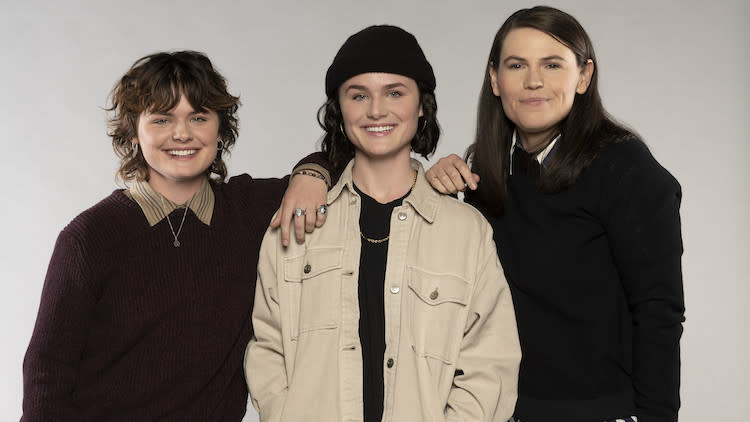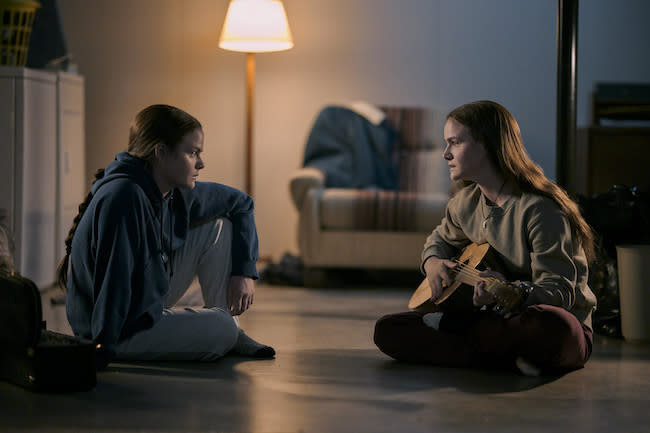Clea DuVall on Relating to High School’s Queer Story and Timelessness

- Oops!Something went wrong.Please try again later.
In the opening scene of new Frevee series High School, Hole’s “She Walks On Me” blares over speakers while TikTok stars (but acting newcomers) Railey and Seazynn Gilliland rock out in flannel, tees, and wide-legged trousers, subtly evoking the 1990s. A queer icon of that decade, Clea DuVall is the perfect executive producer and showrunner, along with Laura Kittrell, to shepherd friends Tegan and Sarah Quin’s 2019 memoir High School to the small screen with an authentic depiction of uncertainty, heartbreak, and discovery set to a grunge and Riot Grrrl soundtrack.
“I wanted [the show] to feel timeless,” she says. “I wanted there to be a classic element to it where the show could be now or it could be three years ago — not leaning too hard into Hey, look, nobody has cell phones, allowing it to be that simple, more innocent time even though they’re kids and are obviously doing things they shouldn’t be doing.”
Clea DuVall and Laura Kittrell
“There was still such an innocence to the time that I feel like it’s not really there anymore,” DuVall adds of the series in which Cobie Smulders plays the Quins’ progressive mom, wise to their experimentation with substances at high school parties.
Cobie Smulders and Kyle Bornheimer
The director of Happiest Season and The Intervention, DuVall has had acting career that dates back more than 26 years. She appeared in era-defining projects like Buffy the Vampire Slayer (1996), The Faculty (1998), Girl, Interrupted (1999), and Jamie Babbit’s camp masterpiece, But I’m a Cheerleader (1999). In the late '90s, DuVall was increasingly sought after in Hollywood, while in the Calgary suburbs, the twin Quin sisters were discovering music and catchy hooks (try to get the lyric “Tegan didn’t go to school today” out of your head after watching High School), all while experiencing the love and heartbreak of first girlfriends — chronicled in their memoir and the show’s first season.
Sara Quin and Railey Gilliland
DuVall met The Quins (who released their first album Under Feet Like Ours the same year But I’m a Cheerleader was released) at one of their concerts about 15 years ago but became good friends a few years later when they were all in Vancouver, DuVall says. While DuVall and the Quins had been close when she read their memoir, it still resonated with her in ways she hadn’t experienced before.
“I felt when they were writing the book, they really tried to tap into the experiences of themselves then and not as the adults looking back on it — really trying to get back into those feelings as they were feeling them in real-time at that time,” she says. “That was powerful to read … to hear those thoughts and feelings articulated in such a vulnerable way was really moving.”
She muses, “Then to also, for the first time, read something that I really connected to in terms of what my coming of age was like. Never before had I ever read or seen or heard of anything that [so closely] resembled my experience.”

The series captures that gray area of LGBTQ+ visibility when musicians like k.d. lang and Melissa Etheridge had come out earlier in the decade, along with the rise of very indie New Queer Cinema, but it was often still lonely and terrifying to come out. So, in addition to Tegan (Railey Gilliland) and Sara (Seazynn Gilliland) honing their musical prowess in the series, they also navigate first (queer) love practically simultaneously yet alone.
Tegan Quin and Seazynn Gilliland
“Their story was so interesting because they’re twin sisters living in the same house. And there’s the assumption made of 'You guys are best friends, you tell each other everything.' There was something about being queer at that time, at least for me," she adds. “My experience of it was ... you weren’t even sure what that meant because there was so little visibility, because there weren’t a lot of discussions about it. Oftentimes, when you did hear anything about gay people, it was negative. So you’re just like Is this OK?”
As High School demonstrates, that can be isolating, even with an ally seemingly in the same room. “Having twin sisters whom you assume would do everything together, really going through the same thing at the same time and not connecting with each other about it really speaks to how singular the coming-out journey is,” DuVall says.
This story is part of The Advocate’s 2022 People of the Year issue, which is out on newsstands November 1. To get your own copy directly, support queer media and subscribe — or download yours for Amazon, Kindle, Nook, or Apple News.

